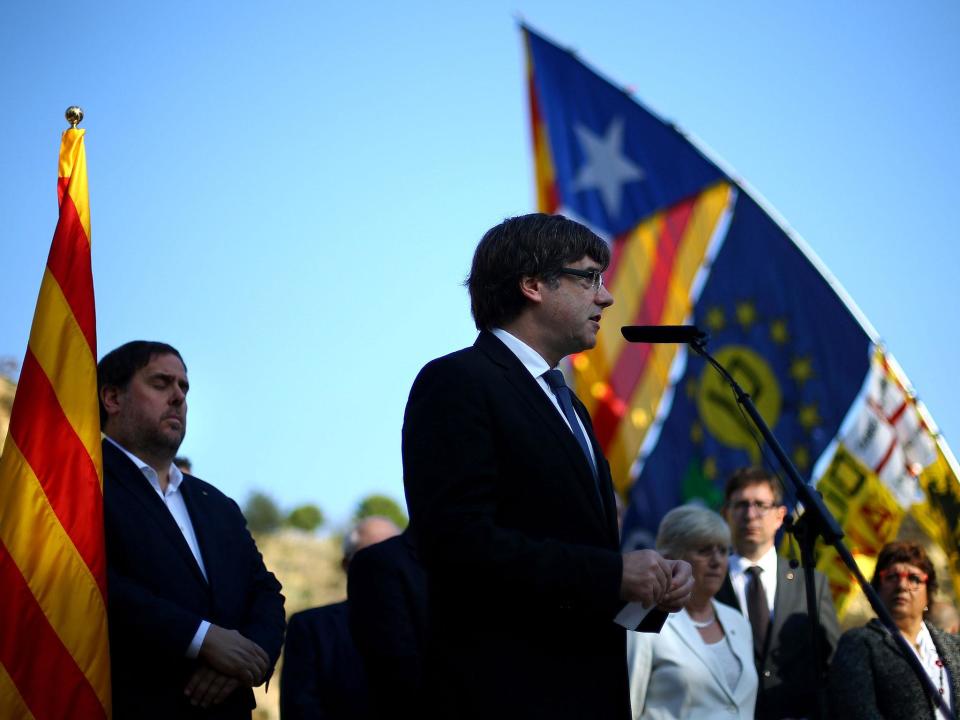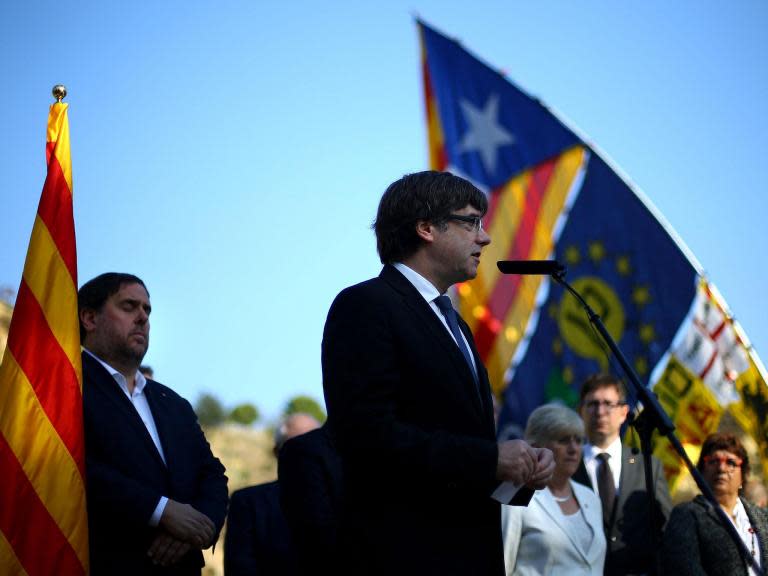The deadlock between Spain and Catalonia can only be solved through dialogue
There is one question about the future of Spain that overrides even that of Catalan independence itself: the prospect of a violent conflict between some of the more militant of the Catalans on the one side, and the more harshly nationalistic elements among the authorities in Spain on the other side of a wall of mutual incomprehension. The next few days will define how this dangerous conflict is to be resolved: through talks and dialogue or via physical force.
So far there has been far too little jaw-jaw. The Catalan question is a political one, infused with linguistic identity, economic power, historic grievances and cultural divergences – though Spanish and Catalans (like Scots and English) have more in common than they like to admit.
It is complex, not least because the desire for independence is hardly unanimous, and arouses the strongest of passions across the whole of Spain. It is not, though, a military issue requiring a military solution – but it is misguidedly becoming so. Sooner or later a bullet will be fired if things go on like this.
As the irresistible force of Madrid’s determination to take back control meets the immovable object of Catalan resistance, it is difficult to see how some physical force is to be avoided. It has already been experienced in saddening scenes of suppression during the referendum. Since then there have been more arrests, incarceration and talk of sedition.
It may not be long before democratic, if rebellious, politicians in Catalonia are locked up on the most serious of charges. The process of escalation of this crisis has already begun: who can tell what dark places it may take Spain into? The oppression of the Basque people and a virulent campaign by Basque terrorists mark a chilling precedent.
No attempts to sack the Catalan regional police or lock up civil servants and ministers will end the crisis. Past experience almost everywhere in the world tells us that it won’t, and that it will only exacerbate tensions, add to the risk of bloodshed and lead to more violence – the familiar cycle. If Madrid has all too easily responded to the Catalan challenge and been exasperated by Barcelona’s more skilful media spin, then the Catalans are also very obviously guilty of wilfully winding up their Spanish counterparts. It seems to have grown into a deadly cat and mouse game. That must now end.
Sooner or later the leader of the provincial Catalan administration, Carles Puigdemont will have to get real and admit that a Unilateral Declaration of Independence (UDI) of the kind now being discussed will be futile internationally and counterproductive internally. The European Union has already said it will not recognise the breakup of Spain, and neither would many other international bodies or nations. Spain controls the currency (through the EU) and the sinews of sovereignty. A UDI by a Catalan Republic would merely make the idea – which has a dignified history – merely look foolish, a political stunt.
Spain, a proud if confused and paranoid nation terrified of disintegration, must also see that it will never be able to govern Catalonia without the consent of the Catalan people, which is why autonomy for some regions is such an important part of the Spanish political system. Trying to disband the police and take over the TV stations will also raise tensions. Slamming Mr Puigdemont in jail, as some demand, would merely turn him into a Catalan Nelson Mandela. It would suit him perfectly well to be a national martyr. The Spanish prime minister, Mariano Rajoy would never be forgiven, and would once again make Spain seem brutal and fascistic.
The stakes for Europe are also high. Nationalism is turning the continent into a patchwork of mini and micro states. There is currently also a legal non-binding referendum on separation being held in Italy’s northern provinces of Trentino and Veneto, wealthy and tired of their current financial position of subsidy payers to the rest of their countries, and thus following a parallel path to Catalonia, though with much less urgency and energy. Flanders, Scotland, Corsica, even Bavaria all have their aspirations to self-rule to a greater or lesser extent.
Where once, by the end of the 19th century, the whole of Europe from the Atlantic to the Steppes was welded into a few mighty blocs by powerful empires, now the existence of the EU itself lends credibility to the idea that small countries can have it both ways. They use membership of the EU to gain access to a vast market and global currency, and to express their international views.
Yet they still have the trappings of self-government. If tiny Malta, Cyprus, Estonia and Luxembourg can be independent then why not much bigger territories?
Still, this fracturing of Europe into dozens of Ruritanian entities isn’t something automatically to be encouraged, given the generally negative consequences of nationalism. That is why some sort of accommodation between Madrid and Barcelona is so desired by their neighbours, for the sake of all.
Increasingly divided by their distinct languages, the Spanish and Catalans no longer seem willing to listen and discuss things with one another. If there were the possibility of a peaceful division, such as the velvet divorce that split Czechoslovakia up in 1992, it might not matter so much. The Spanish constitution, and hardly uniquely, expressly states the Kingdom of Spain is an indivisible whole, and a peaceful independence is not currently possible. It is in the interests of all to break that deadlock and start talking – in whatever language they wish.

 Yahoo News
Yahoo News 

